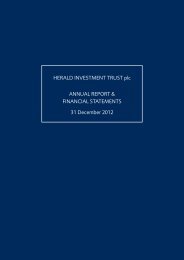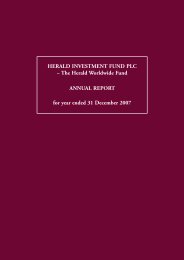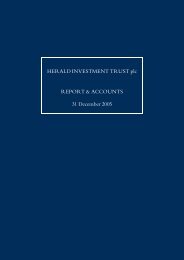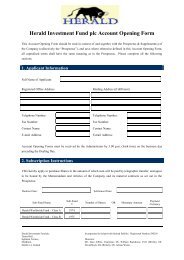HERALD INVESTMENT TRUST plc ANNUAL REPORT ...
HERALD INVESTMENT TRUST plc ANNUAL REPORT ...
HERALD INVESTMENT TRUST plc ANNUAL REPORT ...
You also want an ePaper? Increase the reach of your titles
YUMPU automatically turns print PDFs into web optimized ePapers that Google loves.
<strong>INVESTMENT</strong> MANAGER’S <strong>REPORT</strong><br />
At the start of the year I thought the portfolio was good value, with expectations of solid earnings.<br />
Candidly, I did not expect a return of over 40%. These seem to be the main reasons why my<br />
expectations were exceeded:<br />
1) Global growth exceeded expectations. The structural trade imbalances remain severe and<br />
excessive levels of debt proliferate. While there is an evident credit squeeze on private<br />
sector debt, global fiscal deficits have ballooned, stimulating demand growth and providing a<br />
sympathetic background for growth in corporate profitability for those with sufficient capital. I<br />
have experienced several recessions in my career, but 1980, 1984, 1991 and 2002 all seemed<br />
to have a greater adverse effect on profitability. I suspect this reflects more prudent business<br />
models in TMT companies since the ferocious 2002 downturn, low interest rates and also the<br />
continued buoyant levels of demand reflecting the pervasive adoption of technology in the<br />
enterprise and the home. Relative to bonds, property values and the wider equity markets, the<br />
portfolio’s earnings yield continues to seem good value. However, I cannot fathom out how the<br />
excessive Government fiscal deficits in US, Japan, Europe and the Chinese local Government,<br />
combined with the continued deleveraging of the banks, will play out. The appetite and need<br />
for pensions in the developed world and the dramatic increase in life expectancy imply a higher<br />
savings ratio and subdued consumer demand. This in turn implies that returns on capital will<br />
be low - i.e. capital will be cheap and equities seem likely to become more expensive. This will<br />
be a change from the current environment of capital scarcity and where pension funds have<br />
been migrating into bonds, out of equities. Asset allocation seems to be driven by actuaries and<br />
accounting standards rather than fund managers. The trick will be to find companies that can<br />
continue to grow profits in this environment.<br />
2) Continuing takeovers in the portfolio, with the ability to reinvest on substantially lower valuations<br />
means that in spite of further net outflows from the UK and US markets, redeployment of some of<br />
the proceeds has provided much needed liquidity. This year there have been 13 takeovers in the<br />
portfolio for cash realising £32.3m. In contrast the market for IPOs has again been minimal in the<br />
UK (only Digital Barriers appealed), and although it tried to get going in the US, many issues were<br />
withdrawn. There is a curious dichotomy between some of the larger technology companies in<br />
the US holding huge cash balances which generate an inadequate return on capital, while there<br />
is a shortage of capital for earlier stage companies. This mirrors the divergence in remuneration<br />
between the skilled workers and the unemployed. The knowledge based economy presents<br />
challenges for investors as it does for those starting their careers. The unwillingness by investors<br />
to participate in primary fund raisings has in the short term been helpful to the Company, both<br />
in providing reasonably priced investment opportunities and enabling the focus of available<br />
resources to support the secondary market as described. However, if the UK and the US are<br />
going to maintain their lead in developing leading edge technologies and growing companies<br />
with pricing power, then this capital drought in the venture market as well as the quoted market<br />
has to end. It is a source of frustration that more people do not share my enthusiasm for the<br />
sector in which I believe and invest, with an idealism that it is the sector which can enable the<br />
developed world to sustain and grow its living standards.<br />
3) Innovation continues to open new markets and in 2010 the iPad arrived, stimulating demand<br />
for component suppliers, internet traffic and paid content. This product was more disruptive<br />
than anticipated, has clearly stimulated the portfolio and contributed to upgrades in profit<br />
expectations. The drivers that have led to this eruption include 3G mobile telephones, 802.11n<br />
wifi, touchscreens, multi-threading technology, multi-core processing, increased integration, all<br />
of which have led to market share shifts and spectacular growth for certain companies other than<br />
just Apple.<br />
<strong>HERALD</strong> <strong>INVESTMENT</strong> <strong>TRUST</strong> <strong>plc</strong> 7








